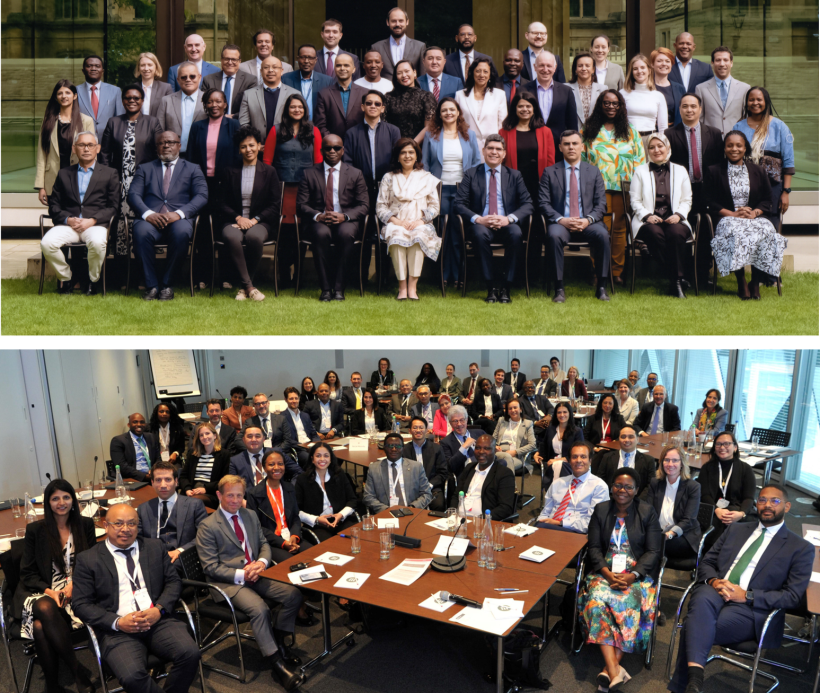Reducing the Protection Gap Against Climate Shocks and Disasters Through Stronger Public-Private Knowledge Partnership

Public-private knowledge partnership is critical to help developing countries develop climate and disaster risk finance strategies as the range of financial products offered by both development partners and the private insurance industry is increasing.
The protection gap against climate shocks and disasters keeps growing in most developing countries. The increasing frequency and intensity of climate shocks such as droughts and floods pose a serious global threat, especially to vulnerable communities. Livelihoods can be destroyed, economies weakened, and development gains and financial resilience eroded. Today, more than four out of five of the world’s unbanked adults – more than one billion individuals – live in the most climate vulnerable countries. This alarming statistic highlights the vulnerability of these communities to climate shocks, as limited financial resilience can drive them to adopt harmful coping mechanisms, exacerbating their already vulnerable situation. Access to insurance remains inadequate in many countries, leaving billions of people without access to adequate protection against climate shocks and disasters. The global insurance protection gap was estimated at 67 percent in 2023: this means that only 33 percent of the direct economic costs of natural hazards, estimated at US$357 billion in 2023, were insured. Coverage is even lower in emerging markets and developing economies, where less than 10 percent of losses are covered by insurance.
The range of financial products offered by development partners and the insurance industry to reduce the protection gap is also growing. Parametric insurance solutions are widely offered by the insurance industry to protect governments and communities, sometimes facilitated by national and regional catastrophe risk pools. Multilateral development banks have strengthened their suite of tools to help developing countries better respond to crises and prepare for future shocks, such as the World Bank Group’s new Crisis Preparedness and Response Toolkit.
In this context, public-private knowledge partnership is becoming even more essential to allow developing countries to better understand their risks and identify the best mix of financial instruments to reduce their protection gap.
The World Bank and the Insurance Development Forum, through their knowledge partnership, recently convened more than 30 senior policymakers from 21 countries across Africa, Asia, and Latin America for a week to share knowledge, build networks, and discuss disaster risk financing instruments. Those discussions took place during the 2024 Insurance Development Forum Summit and its Knowledge Hub Day, and the Crisis and Disaster Risk Finance Executive Education Program, co-delivered with the University of Oxford in partnership with the World Bank’s Global Shield Financing Facility and the Insurance Development Forum.

This was a unique opportunity for policymakers from some of the most vulnerable countries and the insurance industry to share their experience and knowledge and explore new partnerships to reduce the protection gap against climate shocks and disasters. Country delegates highlighted a few key issues.
Disaster risk financing and insurance solutions must be customized to the country's context and constraints. Local context is fundamental in assessing the appropriateness of instruments and collaboration with the domestic insurance industry and global industry can provide the technical tools needed to produce empirical evidence for policy decisions. The development of the domestic financial sector, and its insurance sector, and the financial and institutional capacity of the government are key drivers of sustainable risk finance and insurance solutions.
The cost of insurance is a shared concern, especially as the most vulnerable communities cannot afford insurance. The call for premium subsidies has grown in recent times, as echoed by the Mayor of Freetown, Sierra Leone, who described affordable premium as a major obstacle to insure her community.
Data availability and quality is critical for better climate risk finance and insurance solutions. Delegates questioned the suitability of financing instruments when there is insufficient local data to tailor the approach. Delegates provided actionable solutions to improving data quality by sharing experiences of specific programs, such as strengthening public asset management. Better data ultimately helps Ministers of Finance and other departments make more informed policy decisions. There are growing partnerships between the industry and public sector which countries can tap into to address data gaps.
Better coordination among government ministries is essential to improve the country’s financial protection. Strong coordination is needed from all levels of governments to ensure knowledge gaps are filled, objectives are understood, and roles and responsibilities are defined. This area of focus was emphasized by several participants, who described the benefit of strengthening the link between ministries as a move from a siloed to a cross departmental approach of disaster risk financing.
The week of learning was a clear demonstration of collaboration that provided a platform for strong knowledge exchange, bringing together people and expertise from the insurance industry and countries directly. One of the country participants concluded “These knowledge programs are important because they allow us to share experiences with other countries and to share our needs with the insurance industry. We see that, in many cases, we face the same challenges, and we look for similar solutions.”

Take a look at the recap videos of the Executive Education Program and the Knowledge Hub Day!
For more information please write to us at drfip@worldbankgroup.org.